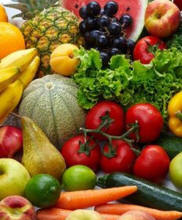Ant-Inflammation Diet Steps

1.
Eat a variety of fresh fruits and vegetables, the more colorful the better.2. If you like fish, eat more, especially coldwater varieties (salmon, mackerel, and herring)
3.
If you like to eat meat and/or poultry, eat lean meats (not corn-fed) from free-range chicken and turkey, grass-fed cattle and buffalo, and game meats such as duck and ostrich.4. If you eat eggs, eat cage-free and organic. If you eat eggs, eat cage-free and organic as much as possible.
5. Use spices and herbs to flavor foods, and limit your use of salt.
6. Use olive oil as your primary cooking oil. Avoid conventional cooking oils, such as corn, safflower, sunflower, and soybean oil, as well as vegetable shortening, margarine, and partially hydrogenated oils. Make your own salad dressings from olive oil and avoid dressings made from corn, safflower, sunflower, and soybean oil.
7. Identify and avoid food allergens. Studies show that up to 50% of people are allergic to gluten (in wheat, rye and barley), and 20% to nightshade vegetables (peppers, eggplant, tomatoes).
8. Avoid or limit your intake of food products that contain refined sugars, such as sucrose (table sugar) or high-fructose corn syrup, including soda, cookies, candy, cake, ice cream and other sweets.
9. Avoid or limit your intake of refined grains. And reduce your intake of whole grains, particularly those containing gluten. Minimize intake of bread and pasta.
10. Limit your intake of dairy products. Non-fat organic yogurt is the best choice.
11. Snack on raw nuts and seeds (next best is dry-roasted and unsalted) or raw vegetables and fruit. Avoid processed snacks like chips, crackers, pretzels and other prepackaged foods which almost always contain refined grains, salt and unhealthy fats.
12. When thirsty, drink water. Avoid soda and limit your intake of fruit juices.
13. Whenever possible, buy and eat organically raised foods. And, when possible, shop at farmers markets for locally grown foods.
14. In addition to the above, consider taking anti-inflammatory supplements, especially vitamin D (2 to 5,000 IU/day), magnesium (200-400 mg/day), fish oils (2 to 3 g/day) and anti-inflammatory botanicals (chiefly turmeric and ginger which can be taken together in supplement form, and green tea which can be taken as a beverage).
Adapted from: The Inflammation Syndrome: The Complete Nutritional Program to Prevent and Reverse Heart Disease, Arthritis, Diabetes, Allergies, and Asthma, by Jack Challem For more information about reducing inflammation and improving health through healthy eating, read his book and/or go to www.stopinflammation.com and www.deflame.com.


